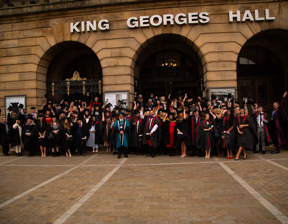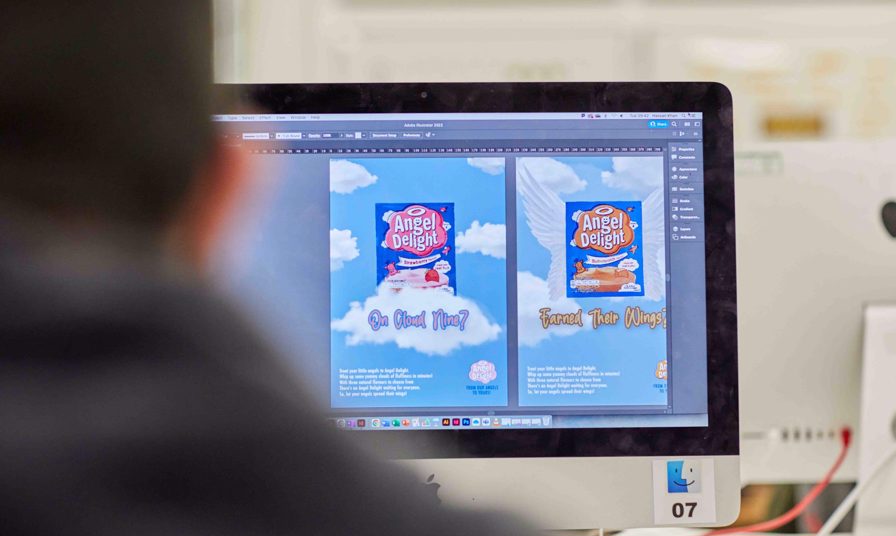Entry Requirements
Minimum of 80 UCAS points
Study Mode
Full time
Duration
Full time:
3 years
Timetable
Various
Key Features & Benefits
- Guest lecture, studio and gallery visits
- Validated by UK Top 15 Lancaster University
- Great links to industry
- Study in our dedicated University Centre
If you want a career as a professional Graphic Designer, then this creative and practical three-year degree is right for you. Learn about page layout, advertising, marketing, illustration and branding as well as using a wide range of techniques, media and industry standard software. You will also have the opportunity to take your designs from the printed page to websites, 3D graphic design and undertake a choice of optional modules in Web and Social Media or Motion Graphics.
-
Overview
If you want a career as a professional Graphic Designer, then this creative and practical three-year degree is right for you. Learn about page layout, advertising, marketing, illustration and branding as well as using a wide range of techniques, media and industry standard software. You will also have the opportunity to take your designs from the printed page to websites, 3D graphic design and undertake a choice of optional modules in Web and Social Media or Motion Graphics. The course has a long history of competition success, and the emphasis in all assignments is on innovation, solving problems creatively, and exploring a range of solutions whilst addressing the needs of industry and the commercial world.
This is a three year Honours degree which aims to equip you for a career in graphic design. We will help you find your unique talents and develop your skills in a friendly and supportive environment. As well as being supported to develop your own style and technique, you will also be introduced to a wide range of new concepts, skills and experiences that will broaden your horizons and make you a better artist and a more employable person.
We also offer a Foundation Entry option for this course:
-
What will I study?
The course is professionally focussed with great links to industry. Teaching staff include professional and experienced commercial graphic designers. As well as your core modules, you will also attend guest lectures from a wide range of speakers in industry, go on studio and gallery visits, and have the opportunity to go on trips, including overseas travel. There are many opportunities for work-based learning through our student design company The Beehive, and placements in studios and creative agencies. You will explore a wide range of styles and approaches, ranging from logo design and packaging to advertising and motion graphics. You will learn about the history and context of design and communication to help you make your work richer and better informed. We will work closely with you to develop your portfolio, online presence and employer contacts so that you will have the best possible chance of getting a job when you graduate.
At Level 4, you are introduced to a range of media through carefully structured technical workshops, lectures and creative assignments with a focus on experimentation. As you progress through Level 5 and Level 6, you develop your own personal practice with the emphasis placed increasingly on professionalism and a commercial awareness. The course has a strong tradition of competition success and all students in the final year negotiate their assignments from a host of live opportunities and competition briefs. The course has formal agreements with several local design agencies. This means that you will have lessons in professional design studios, have lots of opportunities to work on real industry projects and get prestigious work placements.
All students take a total of 120 credits per level.
Level 4 Modules (all modules are mandatory) include:
- Contextual Studies
- Creative Process 1
- Design and Layout
- Drawing Skills
- Digital Skills
- Ideas and Communication
Level 5 Modules (all modules are mandatory) include:
- Critical Studies
- Creative Process 2
- Identity and Branding
- Advertising
- Digital Promotion
- Major Project
Level 6 Modules (all modules are mandatory) include:
- Dissertation
- External Engagement
- Professional Practice
- Final Major Project
-
Entry Requirements
You should have a minimum 80 UCAS Tariff points to join this programme.
Applicants should have and be able to verify that they have a pass in English GCSE or Functional Skills Level 2 English or equivalent as an entry requirement. Proof of this should be shown at the interview.
Applicants should have an interest in the practice of graphic communication or an interest in some aspect of the creative arts. Applicants should attend an interview with their portfolio of work as part of meeting the standard entry criteria for the programme. This interview will perform two purposes:
- To allow the admission tutor(s) to assess the applicant's knowledge of the rudimentary elements of graphic design practice (e.g. drawing skills, basic familiarity with the relevant software and hardware).
- To allow for a supportive discussion surrounding issues such as fees, course structure, support, aspirations and career ambitions, student and our institutional responsibilities.
We welcome applications from mature students without formal qualifications for these courses or from mature students whose Level 3 qualifications were gained more than 5 years ago. If this applies, the interviewer will consider previously gained skills and experience, e.g. through employment or other verifiable source, and any prior formal qualifications. Applicants should attend an interview as part of meeting the standard entry criteria for the programme.
For non-native speakers of English you must demonstrate proficiency of English equivalent to B2 of the Common European Framework, specifically IELTS 6.0 (or equivalent) with no more than 2 sub scores below IELTS 5.5 (or equivalent).
Student Equipment and Financial Investment Required
Applicants should exhibit an interest in the subject of graphic design, either as process or theory. To indicate their interest in this subject area and to enable them to function effectively when on the programme, applicants will need to acquire equipment commensurate with Level 4 by the time they start their studies.
This equipment should include:
- An A3 hard-backed sketchbook containing good quality cartridge paper, minimum weight 120gsm
- Black fine-liner pens such as Unipin or Staedler in a range ofthicknesses
- A set of fine art pencils ranging from 5H to 5B
- A selection of good quality coloured pencils such as Daler, Rowney or Windsor
- Scissors
- Scalpel and blades
- Eraser
- Pencil sharpener
- Glue, either PVA or paper adhesive
- Set of gouache or acrylic paints
- Selection of artists inks
- A range of brushes, including fine ones for detail
- Masking tape
- Memory stick (min 16GB)
Throughout the programme, students will be required to invest in materials for the production and presentation of graphic design work suitable for assessment and (at Level-6) a public exhibition. We recommend that students purchase a laptop computer and purchase access to relevant software if possible.
We advise that any equipment or materials queries be directed to the programme delivery team.
Care Leavers or Young Carers
We want students from all backgrounds to have the opportunity to go to University. If you have spent three months or more in local authority care OR are a young carer, you will be eligible for a contextual offer. This is a grade reduction of 1-A Level grade below our standard entry requirements. For example, a standard offer of CCC, would become CCD. MMM at Level 3 Extended Diploma would become MMP. To apply we advise that you tick the box on your UCAS application which identifies you have spent time in care and to help identify you as eligible for our contextual offer.
-
How will I be assessed?
Throughout the course a full range of assessment techniques will be used.
Examples of assessment activity include:
- Essays and short written tasks
- Seminar presentations
- Presentation of a physical or digital portfolio
- Academic dissertation
- Blog, website or professional social media engagement
- Evidence of internships, work experience or professional communication
- Design reports
- Group presentations and design pitches
- Projects and mini-dissertations
- Peer critique
- Group assessment
-
Teaching and Learning
Learning and teaching will be delivered through a range of established methodologies including:
- Lectures: both formal and informal, with an emphasis on participation
- Seminars: These will include presentations, debates, peer critique, interactive games, idea mapping and quick creative tasks
- Workshops: Core creative skills such as drawing, printmaking, embossing and laser cutting
- Audio Visual materials
- Research: Guided and independent study, team mini-projects and fact-finding missions
- Archive and Library searches
- Distance and e-learning (via VLE)
- Field Visits
- Attendance at conferences, including online events
- Research visits to galleries, workspaces, makerspaces and studios
- Debates and discussions
The learning environment and facilities could include lecture theatres, classrooms, technology suites, laboratories and workshops, library and skills labs, art and photography studios, small group and quiet zones. Learning methods will vary according to the programme of study but will include lectures and group tutorials. In addition, seminars, field trips, work placements, role play or scenario activities, laboratory and workshop practical, demonstrations, guest lectures, discussions and debates all contribute to the learning experience to support the acquisition of subject specific skills and knowledge and the development of transferable and employment related skills.
You should typically expect to have around 15 contact hours per week if you are studying full time.
In addition, you will have timetabled meetings with your personal tutor.
You will be taught by an experienced teaching team whose expertise and knowledge are closely matched to the content of the modules on the course. The team could include senior academics, professional practitioners with industry experience, demonstrators and technical officers. You can learn more about our staff by visiting our staff profiles.
-
What can I do next?
The majority of our graduates go on to relevant employment upon completion of their studies. We work closely with local employers and have an excellent track record of getting our students into their chosen career. Examples include former students who are now professional designers working in local and national design agencies, freelance designers, and many other graduates who go on to set up their own successful design businesses.
-
Supplementary Information
Supplementary Information
This Programme Specification is subject to change, but will give you further information about the course structure, learning outcomes and detailed information about the assessment you can expect during the course.
Work Placements
Work placements are subject to availability. You are also responsible for any costs in travelling to and from your work placements, for any accommodation costs and in some instances the cost of acquiring a satisfactory Disclosure and Barring Service (DBS) report.
-
Fees and Financial information
Going to University is not as expensive as you think. There are no upfront fees to pay if you take out a Tuition Fee Loan from Student Finance England. Don't forget to apply as early as possible to secure your fees before you start your course.

95.8%
Highest in the area for students feeling supported by teaching staff in their learning.














